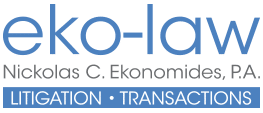What are shareholder derivative actions and specific related laws in Florida?
A Florida shareholder in a corporation has important rights and responsibilities, including their right to bring a shareholder derivative action. A shareholder derivative action is a civil lawsuit brought by a shareholder on behalf of the corporation against a third party, such as corporate officers or directors, for misconduct that harms the corporation. This type of action generally amounts to complex commercial litigation and requires great care. In this article, we will discuss shareholder derivative actions in Florida and give you an idea of exactly what they are.
What is a Shareholder Derivative Action?
A shareholder derivative action is a legal proceeding brought by a shareholder on behalf of the corporation, to recover damages suffered by the corporation because of misconduct by corporate officers, directors, or majority shareholders. This type of civil action is brought by a shareholder who is seeking to hold individuals accountable for actions that have caused harm to the corporation and its shareholders.
In a shareholder derivative action, the shareholder acts as a representative of the corporation, rather than as an individual. The shareholder who brings the lawsuit does not receive any direct financial benefit, but rather is seeking to protect the interests of the corporation and its shareholders as a whole. The goal of the lawsuit is to recover damages suffered by the corporation, which can then be distributed to all shareholders.
Why are Shareholder Derivative Actions Important in Florida?
Shareholder derivative actions are important in Florida because they provide a mechanism for shareholders to hold corporate officers and directors accountable for their actions. In some cases, shareholders claim that corporate officers or directors engaged in misconduct that harmed the corporation and its shareholders. In such situations, a shareholder derivative action seeks to recover damages suffered by the corporation from corporate officers and directors.
For example, if corporate officers or directors engage in self dealing, embezzlement, or other forms of financial misconduct, a shareholder derivative action is likely to recover damages suffered by the corporation as a result. Additionally, if the corporation’s management fails to take action to address the misconduct, a shareholder derivative action is used to bring the issue to the attention of the courts seeking to establish liability on the part of officers and directors.
What are the Steps for Bringing a Shareholder Derivative Action in Florida?
The process for bringing a shareholder derivative action in Florida involves several steps, which typically include:
Demand Letter.
The first step in bringing a shareholder derivative action is to send a demand letter to the corporation’s board of directors, asking them to take action to address the misconduct. If the board fails to act, the shareholder may proceed with the lawsuit.
There is an exception to this requirement where under the circumstances, the demand would be futile, and the reasons demand was futile are included in the complaint.
Filing the Lawsuit.
If the board of directors fails to act, the shareholder may file a lawsuit in a Florida court. The lawsuit must be filed in the name of the corporation and must allege specific acts of misconduct by the corporate officers, directors, or majority shareholders that have caused harm to the corporation.
These acts may include:
- Negligently exposing a company to liability
- Dilution of minority shareholders
- Concealing significant information
- Depriving shareholders of their right to vote
- Conflicts of interest between majority and minority shareholders
- Oppression of minority shareholders
- Breach of fiduciary duties
- Self-dealing
Discovery.
Once the lawsuit has been filed, the parties will engage in a discovery process, during which each side will gather information and evidence to support their case. This may involve taking depositions, requesting documents, and conducting other forms of discovery.
Shareholders generally have the right to review certain documents even without bringing a civil action including:
- Minutes of certain board, committee and shareholder meetings
- Records pertaining to any actions taken without a meetings
- Certain accounting records
- Shareholder records
- Certain information pertaining to the company’s current officers and directors
- Corporate bylaws
- Information pertaining to other lawsuits against the corporation
Trial.
If the parties are unable to reach a settlement, the case may proceed to trial, where a judge or jury will hear evidence and determine whether the defendant is liable for damages suffered by the corporation.
If the litigation is instead settled, the court must approve the settlement and may require the other shareholders be informed of terms of settlement. Whoever wins at trial may also be entitled to their reasonable attorney’s fees.
Conclusion
It is important to note that shareholder derivative actions are complex and time-consuming. Corporate officers and directors are wise to maintain Directors and Officers (“D&O”) Liability Insurance. Given the exception to a written demand under Florida law, corporations should review their policies and procedures for responding to shareholder complaints and concerns. Significant corporate action should always be taken properly and made part of the corporation’s minutes. The annual shareholders’ meeting is an opportunity to present all major actions and decisions of the board of directors and seek ratification thereof.
If you have questions or concerns about potential liability for corporate actions taken, discuss your situation with a commercial litigation attorney to evaluate your exposure to legal liability and review the best course of action for your corporation.







